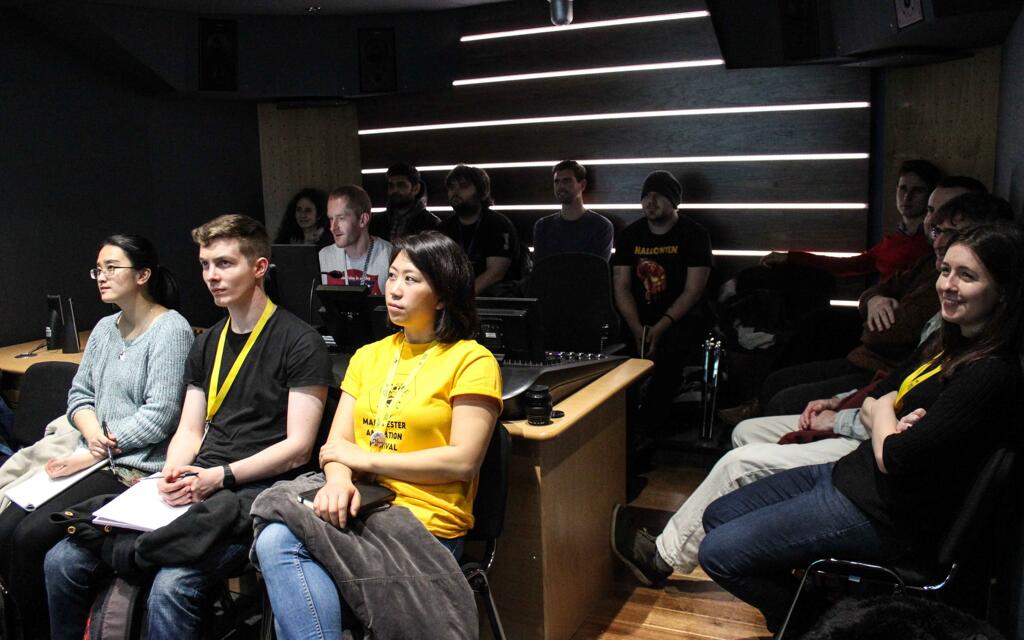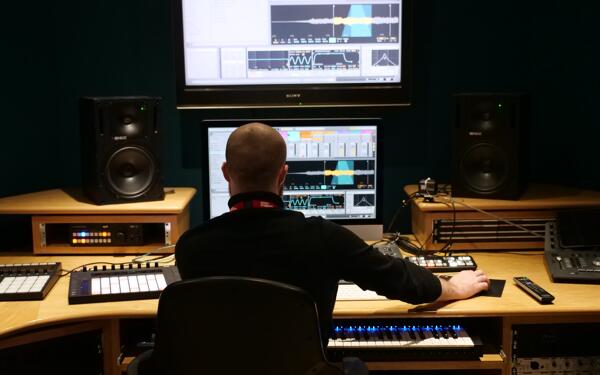 22
Jun
22
Jun
Our next Open Day
Saturday 22 June 12PM-4PM
Open Days are a great opportunity to find out more about our courses, meet our expert tutors and see our facilities in action. They're the perfect introduction to student life.
Book your placeThroughout Electronic Music Production and Performance you’ll explore diverse perspectives on current and emerging electronic music practice while building the creative, technical, and professional skills required to establish your voice as an artist and share it with the world.
Whatever your preferred style, genre and digital audio workstation (DAW) you’ll have the freedom to develop your own sound under the guidance of our expert tutors. With access to a wide range of music technology and software – from Ableton, Moog, Roland, iZotope, Native Instruments and more – you have the potential to experiment with your tracks like never before.
If you’re excited about studying electronic music production, performing live sets and have the drive to take it full-time, this course is for you.
Awarded by

Have any questions or would like to tour our studios? Get in touch
As part of your final project, you’ll have the opportunity to perform your sets in some of Manchester’s most iconic venues. Thanks to our city centre location and local connections, our graduates have performed at The Deaf Institute and Band on the Wall.
As an electronic music production student you’ll be able to book studio time between 9am-10pm Monday to Friday, and 10am-6pm Saturday and Sunday. Our in-house technical support team are on hand throughout the day to provide one-to-one support should you need it.
Our 100 capacity venue is at your disposal. You’ll have lessons here, perform live and practise your sets ready for life as a professional electronic music producer and/or DJ.
Like all of our other facilities, you can access the DJ booths throughout the academic year. These have industry-standard equipment from Pioneer, Technics and Allen & Heath, along with pre-installed filming equipment ready for you to stream or record your sets.
Dan Valentine provides an overview of BA (Hons) Electronic Music Production and Performance:

All of our courses are constantly evolving to ensure teaching and learning remain relevant and up to date. Here is the latest example of the curriculum for Electronic Music Production and Performance:
Creative Music Production fosters the fundamental skills required to compose, arrange and produce your own music. This module encourages you to express yourself while experimenting with a range of electronic music tools and techniques, from synthesis and sampling to drum programming and building chords. You will prepare a portfolio of compositions which showcases your individual style and interests before reflecting on your process in the form of a written report.
Assessment: Portfolio of compositions and report. 40 credits.
This module provides you with the skills you need to take your music from the studio to the stage. You will be encouraged to explore performative approaches to composition and electronic music production, developing a portfolio of compositions that feature hands-on, ‘live’ approaches to music making. Following this, you will be guided through the process of preparing your material for the live environment, culminating in a showcase of your work in our dedicated venue.
Assessment: Composition and performance. 40 credits
Recording Techniques introduces you to the professional studio environment and provides the opportunity to develop key skills in recording, editing, and mixing. You will learn the principles of sound and how to apply them in the studio. You will capture sound with microphones, operate a mixing desk as well as a range of industry standard hardware and software. Through practical experimentation in our dedicated studios, you’ll learn to assess the needs of individual recording sessions and prepare a portfolio of your work while documenting your process in a written report.
Assessment: Signal path test and portfolio. 20 credits.
Electronic Music Contextual Studies explores the cultural, technological and social context for key developments in electronic music practice. You will be encouraged to consider a range of historic and contemporary perspectives on the discipline, as well as conducting your own research into a field of your choosing. In addition to developing your own understanding of the music you create, you will advance essential skills in research, analysis and academic practice.
Assessment: Presentation and essay. 20 credits.
Introducing you to more advanced creative and technical approaches to electronic music production, this module will help to develop your sound design, composition and remixing skills across a range of projects. You will have the opportunity to collaborate directly with other musicians and develop a portfolio that integrates new techniques such as modular synthesis, generative composition and hardware effects processing.
Assessment: Portfolio and presentation. 40 credits.
Providing you with the skills to create a sound library and sampler instrument, this module highlights the creative and technical processes involved in creating industry-ready audio content. Through these sessions you’ll be encouraged to develop work in a specific genre and consider the needs of the end user, gaining a clear understanding of effective workflows for creating an original sample pack.
Assessment: Portfolio and presentation. 20 credits.
Encouraging you to collaborate with other musicians, this module explores your potential as an instrumentalist and performer. You’ll develop technical and creative skills using controller technologies as well as considering unconventional approaches to studio and performance practice, such as turntablism and dub mixing. Following your performance you’ll reflect on the collaborative process and identify the next steps in your progression in an in-person viva voce.
Assessment: A collaborative music performance and presentation. 20 credits.
This module offers you the chance to undertake a self-directed investigation into a research topic that aligns with your interests. You will have the opportunity to explore a hands-on approach to research, grow your knowledge base, and refine the academic skills that are critical to undergraduate success.
Assessment: Essay. 20 credits.
Working to an external client brief, you’ll develop a clear strategy to achieve the goals and requirements of the commissioning client. Assignments in this module will encourage you to think critically about your work and use the skills and knowledge you have gained across other modules to create a product that meets specific criteria.
Assessment: Portfolio and report. 20 credits.
In your final electronic music production module, you’ll learn to draw on new ideas to innovate within your practice. You’ll explore diverse perspectives on composition and production that will inspire you to think differently about your approach to music making. You will have the opportunity to apply creative strategies to generate original tracks, evaluate their success and present them as a finished portfolio. You’ll be encouraged to think critically about your techniques and conduct further research to put your ideas into context, building on the skills you have developed throughout your degree and sharing them with your peers.
Assessment: Composition and presentation. 20 credits.
This is your opportunity to test out everything you’ve learned during your degree as you take your work to the public. With the guidance of expert tutors, you’ll devise a creative project and manage its launch into the public domain. This is a student-directed module which enables you to focus on your individual creative goals in the context of a ‘real-world’ project. Whether you create a live performance, DJ set or score a short film, you’ll have the opportunity to share your work in an iconic venue in the heart of the city as you take your first steps into the industry.
Assessment: Major project and archive. 40 credits.
Concentrating on preparing you for work as soon as you graduate, this module will help you understand how different businesses function in the music and audio industries, and how you can find your place within it. You will be exposed to a range of career opportunities across the creative industries whilst undertaking independent research and development. Through completion of this module, you will gain essential skills relevant to entrepreneurship and self-employment and develop a professional portfolio that is tailored to your career goals.
Assessment: Proposal, portfolio and report. 40 credits.
Considering all aspects of performance, from technical requirements and sound reinforcement to lighting and live projections – you’ll create, prepare, and deliver a collaborative live electronic performance. Through this module, you’ll gain practical skills that are key in preparing you to deliver live sets that represent your creative vision, including developing industry-ready technical documentation and fully realised musical material.
Assessment: Technical specification and live performance. 20 credits.
Teaching on this electronic music production course takes place in a variety of formats including lectures, workshops, demonstrations, peer reviews and one-to-one tutorial support. Our aim throughout is to encourage your creative exploration and hone your technical skills, all so you’ll leave us as a confident, independent professional.
Tutors on our electronic music production course have a wealth of experience, with releases featured in MixMag and Resident Advisor and tracks being played live by the likes of Bicep and Björk. They’ll inspire and support you on your journey with us.
A minimum of 64 UCAS points at A2 or equivalent. You should also have achieved Grade 4 or above in GCSE Maths and English, or an equivalent (UK equivalents include key skills level 3 or functional skills level 2). If you are an international applicant you must have UK settled status in order to study on our degree courses. Non-native English speakers require IELTS: 6.0 with no component lower than 5.5.
Tuition fees for all our undergraduate courses are eligible for government funding through Student Finance England, subject to a successful application.
UK-based university applications are made through UCAS. You’ll need to register via ucas.com to create an application. You can then add this course as a choice to your application using the following information:

If you have any questions about this course, your application or if you'd like to arrange a tour of Spirit Studios, please get in touch on: